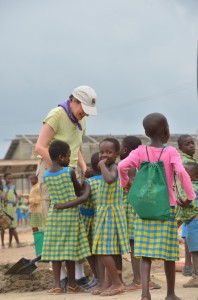
What could our observances of the Yamim Nora’im, the High Holy Days, possibly have to do with a school in a fishing village on the coast of Ghana?
The Jewish New Year celebrates the birthday of the world, harat olam, the beginning of all. This summer, I traveled with American Jewish World Service’s Young Rabbis’ Delegation to Winneba, Ghana. In Winneba, we partnered with an NGO called Challenging Heights that provides education to former child slaves, and resources for families whose children are at risk of slavery and human trafficking. Under the direction of a local contractor and alongside local workers, we spent our mornings mixing and pouring cement, carrying bricks and making mortar for the foundation and walls of a new IT Center. We spent afternoons and evenings learning about social justice and global responsibility from Jewish texts and traditions.
There is so much about our lives in the U.S. and the lives of the children and adults in Ghana that is profoundly different. At the same time, what I learned is that the lives of all of us in the Global North are deeply connected with all who reside in the Global South, whether or not we are personally prosperous or desperately poor.
The nature of this connection between us rabbis and the residents of Winneba became clear to me early on Shabbat morning. I awoke at dawn to see a huge amount of trash in our courtyard being swept up by a woman and a girl from our host’s family. Clearly, the goats got to our trash before we made sure it was safely stored, and before we took care of burning it. We had enjoyed a delicious Shabbat dinner, sang songs, told stories, and ate extra treats. Yet others were now being forced to take on extra work because of our Shabbat oneg, sweeping up the rabbis’ garbage while we slept in on Shabbat morning.
Among the many complex and difficult things I saw and grappled with on this service learning trip, I was most deeply affected by the sight of a young girl holding her back while bending over my trash, sweeping it up more neatly, making the hard brown dirt of her courtyard clear once again.
For every dinner we eat, every day of the year, we are inextricably linked with so many unknown people around the globe—from the planters and gleaners, the packers and shippers, the vendors, builders, trash collectors, their families, and so on. How and if we eat is connected to how and if others eat as well.
Each Jewish holy day—indeed, each day—presents an opportunity for kedusha, for holiness, and tikkun olam, the repair of the world. If our celebrations at the New Year can inspire us to be aware of our sacred duty to care for the kol yoshvey tevel, all who dwell on the planet, then it will indeed usher in a sweet good year for all.
Rabbi Elizabeth Bolton of Congregation Beit Tikvah in Baltimore, MD recently traveled with AJWS on a Young Rabbis’ Delegation to Ghana.
AJWS’s work in countries and communities changes over time, responding to the evolving needs of partner organizations and the people they serve. To learn where AJWS is supporting activists and social justice movements today, please see Where We Work.

